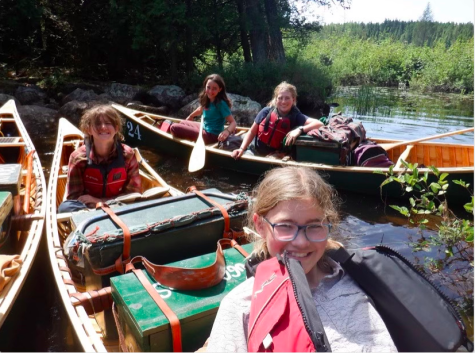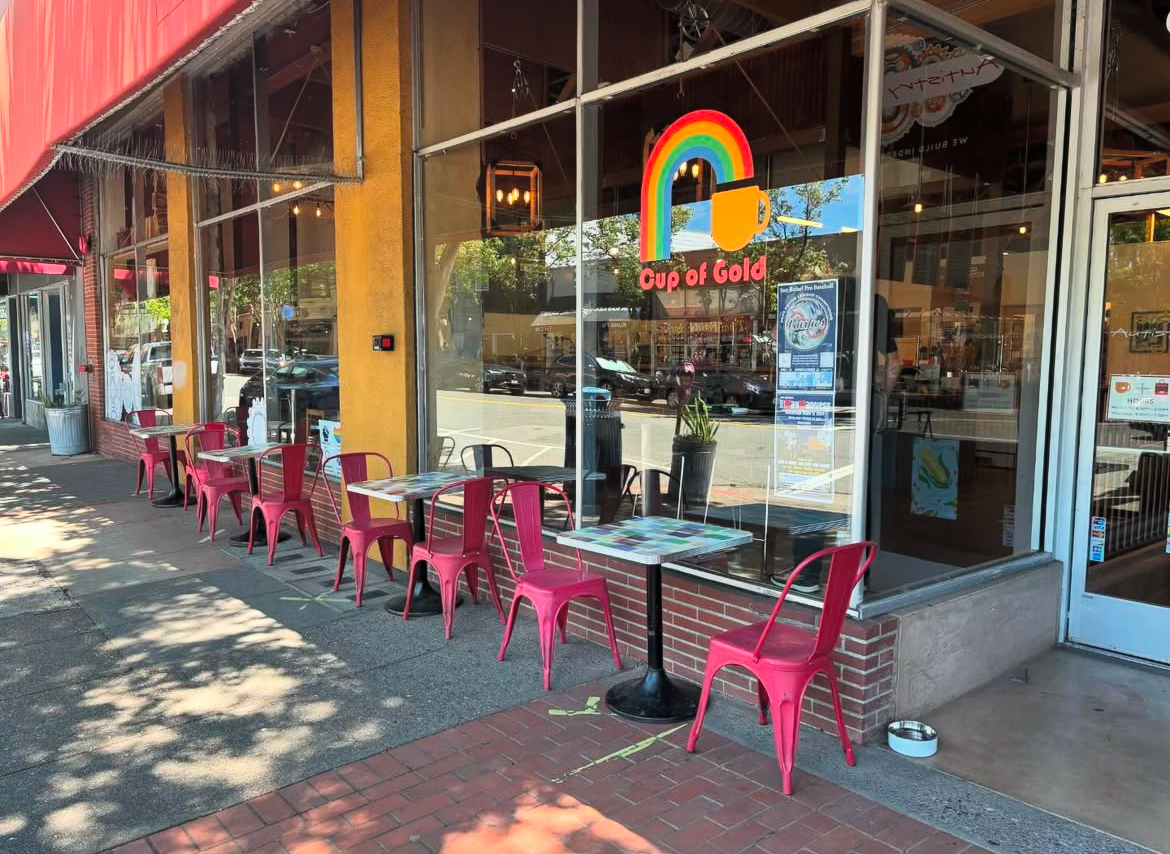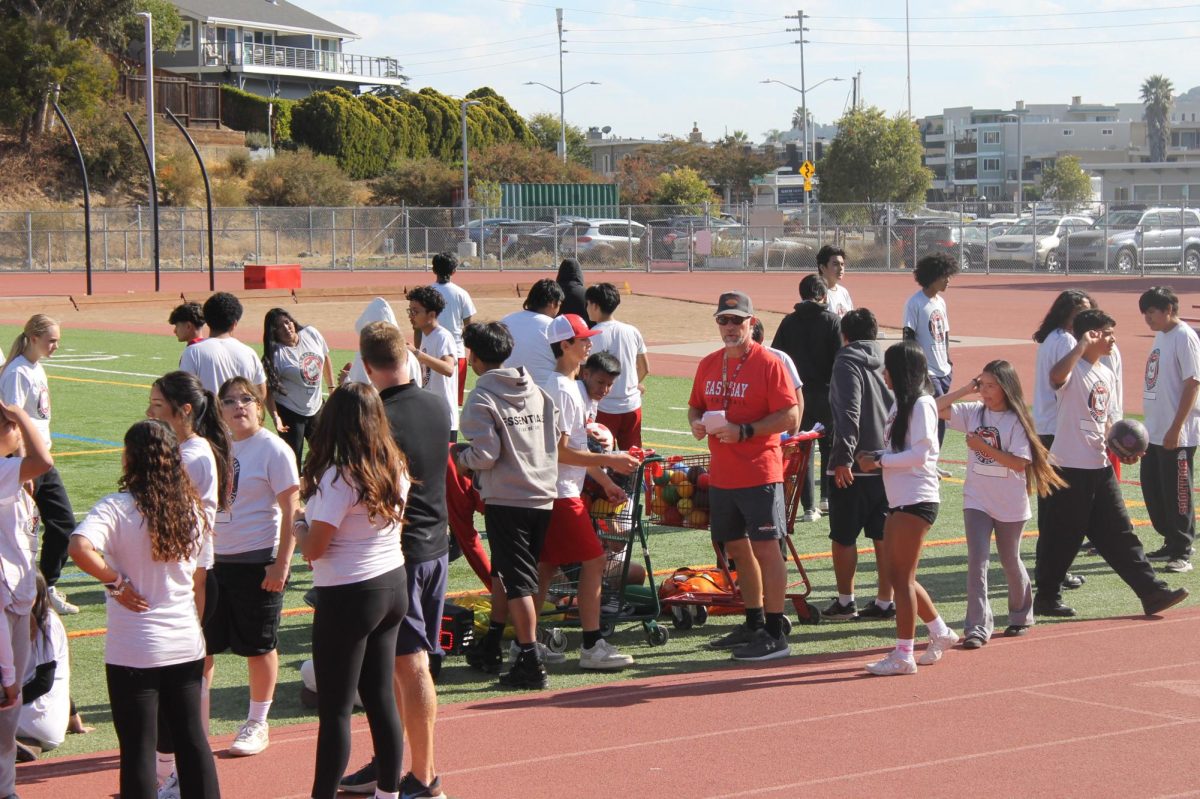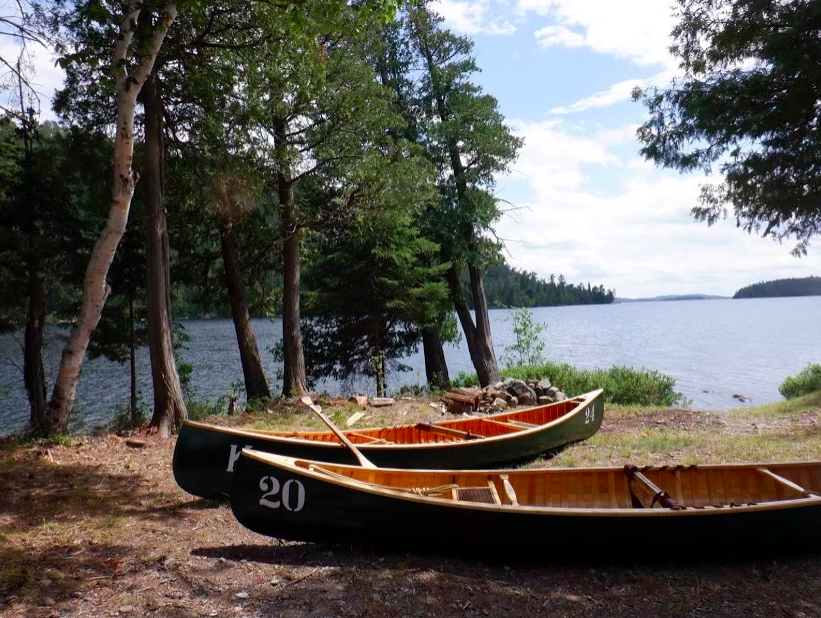Surviving Devil Island
June 8, 2023
The summer going into ninth grade my twin sister and I were sent to a wilderness camp in the Canadian wilderness. For a month we would spend our time canoeing, camping, and portaging (traveling on land from one lake to get to another). This was unlike anything we had ever done before but as it was the wish of my dads side of the family my mom complied.
My sister and I, after many hours of begging and strategizing a way to get out of this trip, boarded our flight to Canada. After a four hour airplane ride we met up with the other campers. We then hopped on a bus and drove for six more hours into the wilderness. We arrived at the boat launch and boarded the boat, as we drove the pit in my stomach grew larger and larger. We made it to the camp where I soon discovered that the camp’s headquarters were located on an Island referred to as Devil Island. I understood this as a sign that this was going to be my hell. I told myself no place named Devil’s Island would be a place I could possibly have any fun.
As the day went on I was introduced to the rest of the girls in my group, Sophie a 12 year old from just outside of Chicago, Maeve a 11 year old from New York City, Lucy a 13 year old who had been going to this camp for as long as she could remember, and Lily a 10 year old girl from Sacramento. We had three counselors, Alegra, Thalia, and Monroe The next day we prepared for our trip into the wild. We learned about everything we would be doing and the traditions of the camp. Tradition I learned was the most important thing to the camp, therefore we used wooden canoes and wooden boxes to store our supplies.The food was quite basic with an everyday staple of oatmeal with peanut butter, which after the fourth day got very boring, almost nauseating.
The way the camp worked was that you would leave basecamp for one week, return and get supplies and then leave for two weeks. The first week was pretty brutal, a very eye opening experience. Before this trip I considered myself to be a pretty outdoorsy person, looking back at it I completely over estimated my skills.
I had not quite imagined how we would be traveling from lake to lake but assumed we would be carrying our supplies with our hands, however this was not the case. Instead we used leather straps called tumpline straps that would rest on our foreheads and wrap around the 80 pound wooden canoes, putting the pressure on your head instead of your arms. We practiced flipping the canoe from the ground onto our heads. A movement that looks relatively easy but is quite the opposite. It takes balance, strength and patience, all things that at the beginning of the trip I lacked.

During our first week, we learned all the basics. We were taught how to do a C stroke, J stroke, and parallel strokes. We were taught how to pitch the tents and start a fire. There was no warming up to the learning curve, you were thrown into the deep end of the lake.
One of the first things I learned that I had no clue about was, what was in the lakes. I was told that most of the lakes we would be paddling on were leech infested. This in itself was unsettling but I felt relieved when I was taught the hack of tucking your pants into your long sock so they couldn’t get to you. However when away from basecamp those lakes were our source of water. When your bottle was out of water you would simply just lean over the canoe and fill the bottle up, simple as that. Before the trip I had anxious feelings regarding water quality, I was scared of small specs of dirt in my water but learned that was not my biggest concern, when there could be blood sucking parasites in my water.
It was less than halfway through the three week trip when my sister and I realized we did not know how much more of this we could take. We were alone cutting the wood, between the push and pull of the flimsy rust covered saw we devised a plan. The plan was that we would break Piper’s arm, it was foolproof. I would have her rest her arm on a log with her forearm on one side biting down on the leather tumpline. In one quick moment with no hesitation I would jump on it. She would obviously need to get medevaced out of the wilderness, but would demand I come with. This was crazy on two levels, one being that I would break my own sister’s arm and that Piper would ride in a helicopter, as her biggest fear in life is helicopters. As the weeks went on Piper and I realized that this was a dramatic solution for a not so dire situation. The uncomfortableness that this trip gave me was temporary but the memory of breaking your sister’s arm is not.
At this point in the trip there were only a couple days left and the light at the end of the tunnel was getting brighter and brighter. The last hump we had to get through was The Bog. A mud so thick it should be considered a solid with a stench so strong that I can still smell it four years later and 3,000 miles away. The state of the bog is what made it so difficult to navigate. It was too thick to paddle through but not solid enough to stand on it. There was no way around The Bog, it was the only thing standing between me and civilization, and nothing was gross enough to stop me from running water. We all got out of our safe canoes and dropped deep into The Bog. For me The Bog hit me at my hips but some were not as lucky. As we trudged our way through we finally hit land. Eureka!
Then came my next battle, I was selected as tribute to carry the canoe on this portage, a feat that was only for the strongest. Actually everyone was able to carry the canoe except for Lily, the canoe unfortunately weighed more than her body weight. The trail started rather nicely while winding in between the most gorgeous pine trees. When all of a sudden I came to what looked like a cliff. Now that is a bit dramatic it was not a vertical drop off but even without the canoe on my head I would be hesitant to walk down it. The only thing on my mind was a mountain goat, at that moment I became a mountain goat. I was the mountain goat. I somehow managed to survive the dangerous terrain, I thought it could not have gotten worse, but I was wrong, once again. My next obstacle was nothing short of boulders. I tried navigating myself from one boulder to the next with the 80 pound wooden canoe on my head, still covered in bog. I made it on to the first rock and put my left leg out for the next when I slipped, my life moved in slow motion. I suddenly was able to see into the future and saw that if I landed onto the ground with the canoe on my head my neck would snap, like a twig under a foot. As the image of this happening came across my mind, I used all my weight to throw it off of me. Thankfully my attempt had been a success and my head was still attached to my body. However unfortunately for me I forgot how sacred the canoes were to the camp. As I am still picking my body off the boulders I am being lectured on how disrespectful what I did was. How I should have been moving slower, watching my steps, and keeping the canoe balanced. Once the lecture ended I gathered my thoughts and composed myself. I assessed myself for any wounds and found nothing but the beginning of a massive bruise. I moved over to the canoe and assessed it, to find that it was still intact with just a couple of scrapes that could be covered in paint. I spent the rest of the portage engaging in a conversation in my own head of how I really felt about the canoe.
These stories are more than just these memories of my struggles. The trip had more fantastic moments than it did bad. For instance we were paddling and turned a bend when I saw the most beautiful cliffs surrounding a portion of a lake that was untouched from the wind. The water was glass and reflecting my starstruck face back at me. Alegra asks if we want to hear something cool. I was not quite sure what could be cooler than what I was looking at but welcomed her invitation. She then at the top of her lungs screamed “Hello!” The cliffs returned her call with the loudest echo I had ever heard, it was somehow louder than the original scream. I set down my paddle and took in the immense beauty I was surrounded by. My thoughts were cleared and there was nothing on my mind, no stress or anxiety, just the pure beauty I was surrounded by.
Though this trip was not perfect, it taught me one thing I will never forget. It taught me to put my life back home in perspective. I realized that the daily things in life that would cause me stress were not as high stakes as I had believed them to be. I learned what it takes to have balance, strength and patience in life.
Nature is pure and untarnished by human destruction, while anxiety is a complication of a world too busy to slow down and appreciate. Experiencing this time in nature has given me the ability to breathe a true breath of clarity and create a thought that isn’t interrupted by tomorrow’s stress. I understand now that the world is much bigger than just one person, there are more interesting and beautiful things to surround yourself with than worries.







































jade von doepp • Jun 9, 2023 at 12:46 pm
wow so good it blew me away